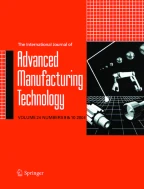Abstract
An improved iterated greedy algorithm (IIGA) is proposed in this paper to solve the no-wait flow shop scheduling problem with the objective to minimize the makespan. In the proposed IIGA, firstly, a speed-up method for the insert neighborhood is developed to evaluate the whole insert neighborhood of a single solution with (n − 1)2 neighbors in time O(n 2), where n is the number of jobs; secondly, an improved Nawaz-Enscore-Ham (NEH) heuristic is presented for constructing solutions in the initial stage and searching process; thirdly, a simple local search algorithm based on the speed-up method is incorporated into the iterated greedy algorithm to perform exploitation. The computational results based on some well-known benchmarks show that the proposed IIGA can obtain results better than those from some existing approaches in the literature.
Similar content being viewed by others
References
Stadtler H (2005) Supply chain management and advanced planning—basics, overview and challenges. Eur J Oper Res 163(3):575–588
Pan Q-K, Tasgetiren MF, Liang Y-C (2005) A discrete particle swarm optimization algorithm for the no-wait flowshop scheduling problem with makespan criterion. In: Proceedings of the 24th Annual Workshop of the UK Planning and Scheduling Special Interest Group (UK PlanSIG 2005), London, UK, December 2005, pp 31–41
Wang L, Zheng D-Z (2003) An effective hybrid heuristic for flow shop scheduling. Int J Adv Manuf Technol 21(1):38–44
Dimopoulos C, Zalazala AMS (2000) Recent developments in evolutionary computation for manufacturing optimization: problems, solutions, and comparisons. IEEE Trans Evolut Comput 4(2):93–113
Liu B, Wang L, Jin Y-H (2007) An effective hybrid particle swarm optimization for no-wait flow shop scheduling. Int J Adv Manuf Technol 31:1001–1011
Pan Q-K, Tasgetiren MF, Liang Y-C (2006) Minimizing total earliness and tardiness penalties with a common due date on a single-machine using a discrete particle swarm optimization algorithm. Lect Notes Comput Sci 4150:460–467
Li B-B, Wang L (2007) A hybrid quantum-inspired genetic algorithm for multiobjective flow shop scheduling. IEEE Trans Syst Man Cybern B Cybern 37:576–591
Wang L (2003) Shop scheduling with genetic algorithms. Tsinghua University Press, Beijing, China
Rajendran C (1994) A no-wait flowshop scheduling heuristic to minimize makespan. J Oper Res Soc 45:472–478
Hall NG, Sriskandarayah C (1996) A survey of machine scheduling problems with blocking and no-wait in process. Oper Res 44:510–525
Grabowski J, Pempera J (2000) Sequencing of jobs in some production system. Eur J Oper Res 125:535–550
Raaymakers WHM, Hoogeveen JA (2000) Scheduling multipurpose batch process industries with no-wait restrictions by simulated annealing. Eur J Oper Res 126:131–151
Rock H (1984) The three-machine no-wait flow shop problem is NP-complete. J Assoc Comput Machinery 31:336–345
Bonney MC, Gundry SW (1976) Solutions to the constrained flowshop sequencing problem. Oper Res Q 27:869–883
King JR, Spachis AS (1980) Heuristics for flowshop scheduling. Int J Prod Res 18:343–357
Gangadharan R, Rajedran C (1993) Heuristic algorithms for scheduling in the no-wait flowshop. Int J Prod Econ 32:285–290
Aldowaisan T, Allahverdi A (2003) New heuristics for no-wait flowshops to minimize makespan. Comput Oper Res 30:1219–1231
Schuster CJ, Framinan JM (2003) Approximative procedures for no-wait job shop scheduling. Oper Res Lett 31:308–318
Grabowski J, Pempera J (2005) Some local search algorithms for no-wait flow-shop problem with makespan criterion. Comput Oper Res 32:2197–2212
Ruiz R, Stützle T (2007) A simple and effective iterated greedy algorithm for the permutation flowshop scheduling problem. Eur J Oper Res 177:2033–2049
Jacobs LW, Brusco MJ (1995) A local-search heuristic for large set-covering problems. Nav Res Logist Q 42(7):1129–1140
Marchiori E, Steenbeek A (2000) An evolutionary algorithm for large scale set covering problems with application to airline crew scheduling. Lect Notes Comput Sci 1803:367–381
Nawaz M, Enscore EE Jr, Ham I (1983) A heuristic algorithm for the m-machine, n-job flow shop sequencing problem. Omega 11:91–95
Koulamas C (1998) A new constructive heuristic for the flowshop scheduling problem. Eur J Oper Res 105:66–71
Turner S, Booth D (1987) Comparison of heuristics for flow shop sequencing. Omega 15(1):75–85
Carlier J (1978) Ordonnancements à contraintes disjonctives. RAIRO Rech Oper 12:333–351
Reeves CR (1995) A genetic algorithm for flowshop sequencing. Comput Oper Res 22:5–13
Heller J (1960) Some numerical experiments for an M×J flow shop and its decision-theoretical aspects. Oper Res 8:178–184
Osman IH, Potts CN (1989) Simulated annealing for permutation flow-shop scheduling. Omega 17(6):551–557
Wang L, Zheng D-Z (2001) An effective hybrid optimization strategy for job-shop scheduling problems. Comput Oper Res 28(6):585–596
Author information
Authors and Affiliations
Corresponding author
Rights and permissions
About this article
Cite this article
Pan, QK., Wang, L. & Zhao, BH. An improved iterated greedy algorithm for the no-wait flow shop scheduling problem with makespan criterion. Int J Adv Manuf Technol 38, 778–786 (2008). https://doi.org/10.1007/s00170-007-1120-y
Received:
Accepted:
Published:
Issue Date:
DOI: https://doi.org/10.1007/s00170-007-1120-y
